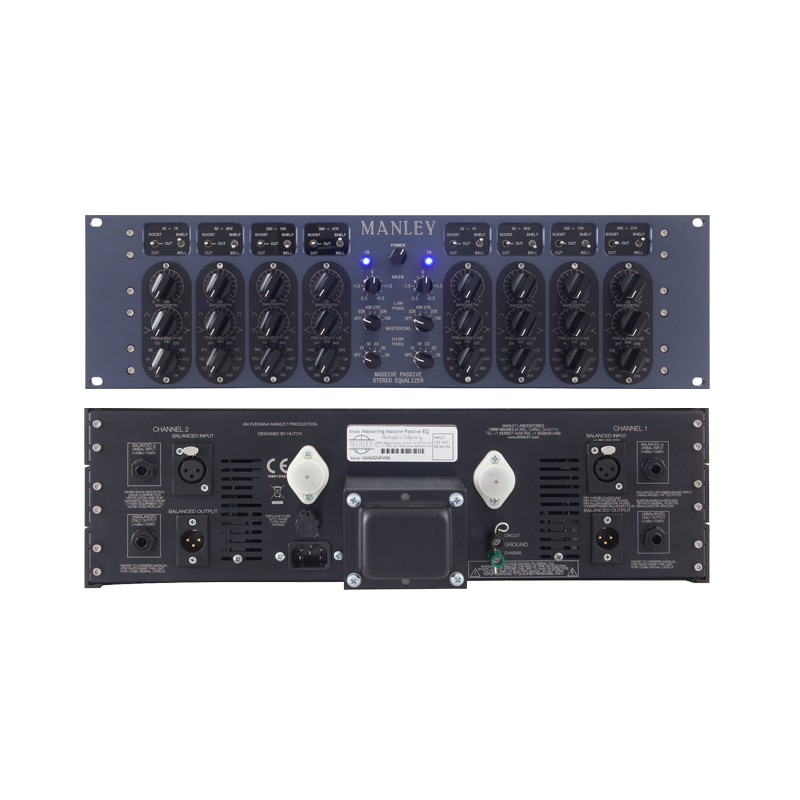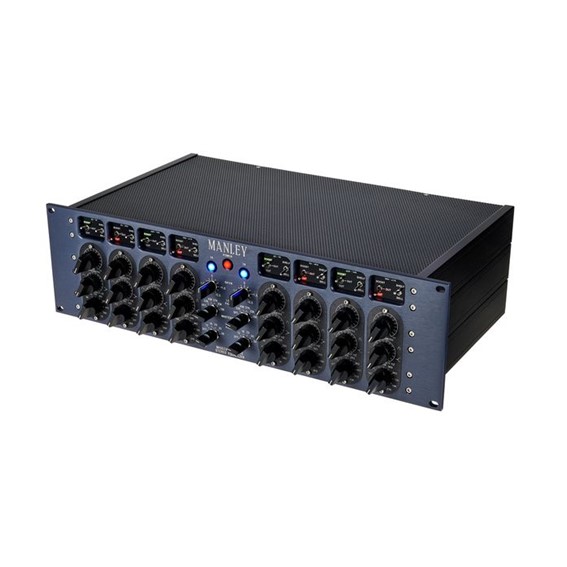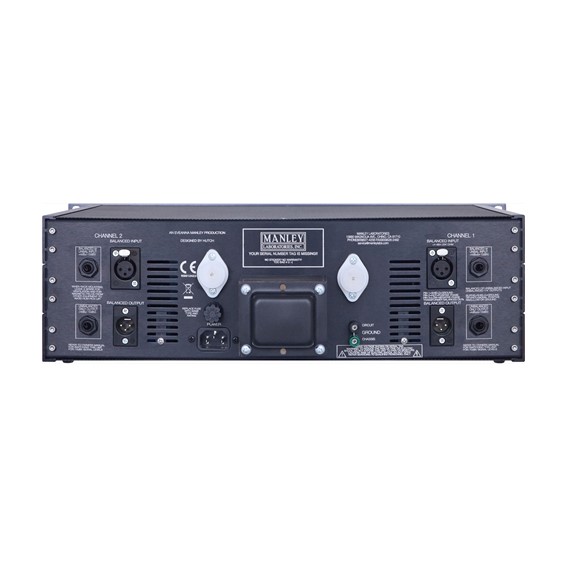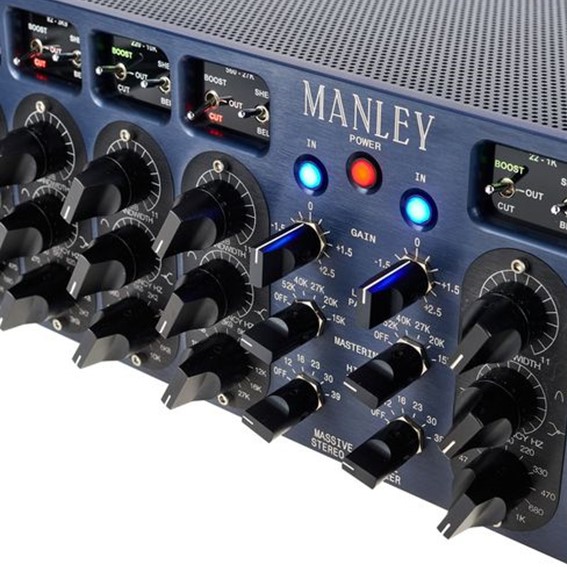- Your cart is empty
- Continue Shopping
Product Description
Manley Massive Passive Mastering Version
This is the Mastering Version of the Massive Passive with innovative repeatable, mechanically detented knobs of our own design. Range is clamped down for focus where mastering engineers live and breathe. Filters go higher and lower for solving problems in the mastering stage.
Yes! Manley Mastering Version Massive Passive Stereo Tube EQ
WE CAME UP WITH A CLEVER WAY TO PULL THIS OFF…
WITHOUT breaking your bank account thanks to these interesting mechanically detented knobs for the GAIN and BANDWIDTH controls! These knobs are of our own design. They are a clever two-part metal design using a ball and spring detent system. They ensure repeatability and a good, positive feel, without the incredible cost and space problems tons of Grayhill switches would have caused.
Some notes pertinent to the Mastering Version:
The Massive Passive is a passive design and not a “true parametric”. A true parametric implies non-interacting controls. In the Massive Passive, the “GAIN” and “BANDWIDTH” controls DO interact (on purpose). We cannot create a “GAIN” switch that is set up for “consistent” 1/2 dB steps. When you change the “BANDWIDTH” the step size must and will change. On the regular version, you get a full 20dB boost or cut only when: the bandwidth is fully clockwise (narrow) in bell mode or fully counter-clockwise in shelf mode. Here on the Mastering Version, this maximum boost or cut is 11dB. Conversely at the widest bell, the maximum boost or cut is 6dB and the narrowest shelf maxes out at 12 dB. A similar situation is also true for the bandwidth detents. So in this new Mastering Version, do not expect a certain dB change per step as it will vary according to where the bandwidth is set. But whatever the step sizes are, they will be repeatably 16 steps. The FREQUENCY select is already detented as it is and always has been a Grayhill switch. It also interacts in shelf mode.
On a similar note, the Massive Passive is a “parallel design” and not the conventional “series design”. This means the bands interact with each other too. It is possible, to set a band to boost 20 dB but if another band is boosting near or at that frequency, very little will happen. On a conventional EQ the two bands “add” and you would be boosting 40 dB into clipping. Because the bands interact, predictable step sizes are unrealistic, however, with the Mastering Version, you will be able to repeat settings (if you log them of course). The price paid for interacting bands, is a better sounding EQ and bizarre looking settings (on purpose).
Unlike virtually every other EQ, the Massive Passive allows much more EQ without sounding “processed”. Where 5 or 6 dB is about all one could attempt with other EQs in mastering, the Massivo amazes engineers with how much EQ they can do and get more “natural” results at the same time. We could have squeezed 11 position Grayhill switches in the modules if we had wanted 1/2 dB steps but then the maximum range would have become only 5.5 dB. Remembering what we stated above, the minimum range would then become about 1.5 dB with approximately 0.2 dB steps. This approach would have essentially thrown away most of the useful range the unit is capable of. Going with these special mechanically detented knobs which use the same pots underneath that the normal Massivo uses, we get nearly all the range of the normal version, but with the repeatability of the detents.
We have also custom tailored the FILTERS in the Mastering Version specifically for Mastering purposes, moving them lower and higher than the normal version, with mastering engineers specifically in mind. If you are looking for drastic effects (like telephone sounds) then get the normal version. These filters are really geared for mastering engineers.
Additionally, the Master Gain Trim controls in the Mastering Version are true 11 position 1/2 dB stepped Grayhill switches set up for a range between -2.5 to 2.5 dB of master gain trim. This allows more confidence in left/right matching and calibration.
The best advice is, before you decide, or even form an opinion about whether to go with a normal or mastering version Massivo, is to use a regular Massive Passive for a session or two in your own room. We have seen in the past that the only engineers who have asked about a mastering version had yet to try the Massive. Using your previous extensive and intensive experience with other EQs may be a mistake, especially if you expect the Massive Passive to be roughly similar to them. It isn’t. Please, try it first, then decide.
FEATURES
- All-Passive tone sculpting circuitry
- Unique Shelf curves use the “bandwidth” control
- Overlapping and Interleaved Frequency choices
- Every band switchable to shelf or bell
- Vacuum tube make-up gain and line drivers
- Parallel symmetrical topology
- Premium components throughout
- HP and LP Filters
- STEPPED GAIN trims -2.5 to 2.5dB in 11 steps of 1/2dB each
- Metal Manley mechanically detented GAIN and BANDWIDTH control knobs
SPECIFICATIONS:
- Inputs: Balanced XLR & 1/4” (accepts unbalanced)
- Outputs: Balanced XLR (accepts unbalanced) & Unbalanced 1/4”
- Level 4 dBu nominal
- Bypass Switch bypasses EQ & tube circuits (not hardwire)
- 44 Frequencies (roughly 1/4 octave spacing)
- Frequency Range: 22 Hz to 27 kHz
- EQ Boost/Cut Range : Maximum 11dB boost or cut
- Nominal Q range: 1.5 to 3 (uniquely active in shelf modes)
- Frequency Response: /- 2 dB: 8 Hz to 60 kHz
- Maximum Output @ 1.5% THD 37 dBv; 26dBv @ 20 Hz
- THD & Noise (1kHz @ 4 dBu): 0.06%
- Noise Floor (referred to 4dBu): -85 dB (A Weight)
- Dynamic Range: 120 dB
- Tube Complement: 2 x 12AU7, 4 x 6414
- Auto-mute warmup delay = 20 seconds
- Power Consumption (120/240VAC): 44 watts
- Mains Voltage & Frequency (VAC/Hz): Internal Universal Power Supply 90-254 VAC / 50-60Hz
- Mains Voltage Frequency: 50~ 60Hz
- Size (3U): L 19” x W 10” x H 5.25”
- Unit Weight: 15.5 Lbs.
- Shipping Box: L 23” x W 15” x H 10”
- Shipping Weight: 26 Lbs.
| Berat | 15 kg |
|---|




